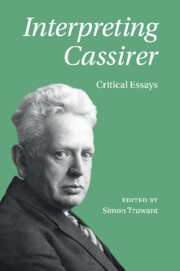Book contents
- Interpreting Cassirer
- Interpreting Cassirer
- Copyright page
- Contents
- Contributors
- Acknowledgments
- Abbreviations
- Introduction
- Part I Cassirer’s Philosophy of Culture
- Part II Cassirer’s Philosophy of Consciousness
- Chapter 8 Rethinking Representation
- Chapter 9 Cassirer’s Philosophy of Mind
- Part III Cassirer’s Philosophical Method
- Bibliography
- Index
Chapter 8 - Rethinking Representation
Cassirer’s Philosophy of Human Perceiving, Thinking, and Understanding
from Part II - Cassirer’s Philosophy of Consciousness
Published online by Cambridge University Press: 17 April 2021
- Interpreting Cassirer
- Interpreting Cassirer
- Copyright page
- Contents
- Contributors
- Acknowledgments
- Abbreviations
- Introduction
- Part I Cassirer’s Philosophy of Culture
- Part II Cassirer’s Philosophy of Consciousness
- Chapter 8 Rethinking Representation
- Chapter 9 Cassirer’s Philosophy of Mind
- Part III Cassirer’s Philosophical Method
- Bibliography
- Index
Summary
Martina Plümacher considers the fundamental questions of how signs succeed in representing something that is not currently present, and what exactly they represent. In this chapter, Plümacher illustrates in what sense Cassirer characterizes representational thinking as a sign-based, creative mental activity that is also involved in the perceiving of objects and processes. In this way, Cassirer develops a new conception of representation that goes beyond both traditional representationalism and imitation theory of knowledge. First, the representational character of perceiving, thinking, and understanding are understood as contextual, situated, and perspectivized way of knowing. Second, the processes of representing and knowing are not passive imitations of the world but active processes of orienting our perceiving, speaking, thinking, and acting. Third, the organizing activities of representation are supported by certain orders of knowledge. These three aspects allow Plümacher to specify and to spell out the pragmatic tone in Cassirer’s philosophy of human consciousness.
Keywords
Information
- Type
- Chapter
- Information
- Interpreting CassirerCritical Essays, pp. 151 - 169Publisher: Cambridge University PressPrint publication year: 2021
Accessibility standard: Unknown
Why this information is here
This section outlines the accessibility features of this content - including support for screen readers, full keyboard navigation and high-contrast display options. This may not be relevant for you.Accessibility Information
- 2
- Cited by
